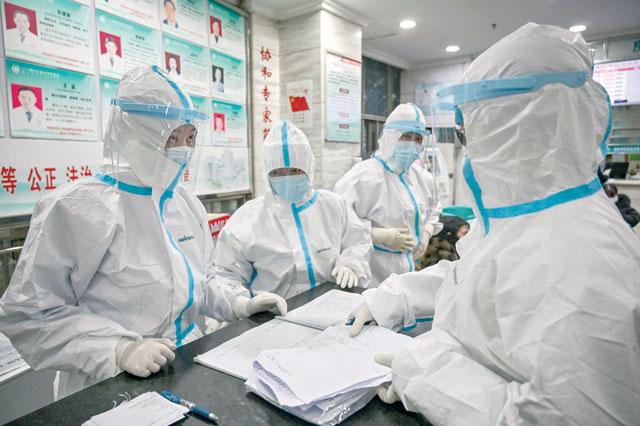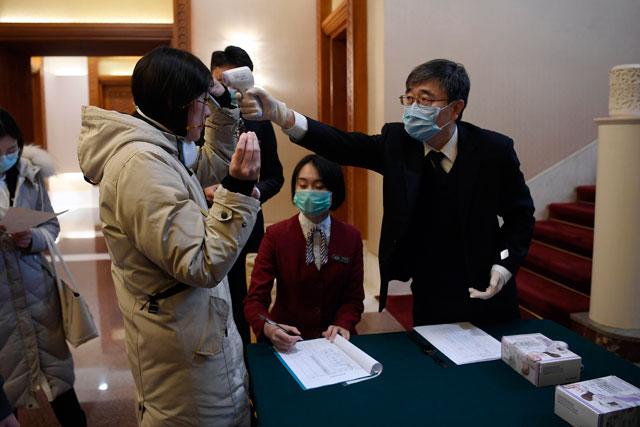You are here
King issues directives to evacuate Jordanians from virus-hit Wuhan
By Maram Kayed , Petra - Jan 25,2020 - Last updated at Jan 25,2020

Medical staff members, wearing protective clothing to help stop the spread of a deadly virus which began in the city, work at the Wuhan Red Cross Hospital in Wuhan on Saturday (AFP photo)
AMMAN — His Majesty King Abdullah has issued directives to dispatch a plane to evacuate Jordanians residing in the coronavirus-hit Chinese city of Wuhan, the Jordan News Agency, Petra, reported on Saturday.
The government, through the Foreign Ministry, has received consent from the Chinese authorities to evacuate the Jordanians in Wuhan, which has been quarantined, Petra, said.
No cases of the fast-spreading Coronavirus have been registered in Jordan, the Ministry of Health stated recently.
Minister of Health Saad Jaber affirmed in a statement that although the ministry has declared a state of emergency, Jordan has not yet recorded any cases of the virus, which was first reported in China and is now present in the United States, Australia and France.
“We have employed cadres and prepared facilities to the highest levels of readiness to deal with any developments related to the virus,” Jaber said in the statement.
During a National Epidemic Committee meeting attended by representatives of several ministries and institutions on Friday evening, it was announced that the medical protocols prepared in advance to deal with any fast-spreading virus have been activated, and that trained medical staff are “able to deal efficiently with these types of viruses and diseases”.
Jaber stressed during the meeting that health control measures, including the use of thermal scanners at border crossings and airports are being implemented to ensure the safety of travellers arriving on flights coming from East Asian countries.
The government is in contact with the World Health Organisation to monitor the latest developments on the spread of the virus and its prevention and treatment protocols.
As for the health and safety of Jordanians abroad, Spokesperson for the Ministry of Foreign Affairs Deifallah Fayez said in a separate statement that the ministry has been following up on the health conditions of Jordanian citizens and students residing in Wuhan, China, where the virus was claimed to originate, through the Jordanian embassy in China.
The embassy has tallied the number of students and Jordanian nationals located in the province of Hubei, near the city of Wuhan, he said, adding that the current number of Jordanians in the area is estimated at around 100.
The ministry said there are no recorded cases of the virus among Jordanians residing in Wuhan, and the administrations of universities have been contacted, with the latter reporting that they have taken all precautions to combat the spread of the virus on campus, in addition to conducting periodic field medical examinations.
Fayez called on the Jordanian community residing in China, particularly in Wuhan, to adhere to the precautionary instructions and guidelines issued by the Chinese authorities and to communicate with the Jordanian embassy in Beijing or the Health Ministry’s emergency centre.
The Embassy of Jordan in Beijing advised its citizens to contact the embassy at 008618611731739 or to directly contact the ministry’s emergency centre at 00962795497777 for emergencies.
Doctor Emad Abu Ramah told The Jordan Times that coronavirus is a “tricky one” in the sense that it may not display symptoms, but can be spread through coughing and sneezing.
“The use of a surgical mask is a precautionary measure, but people need not worry yet since the countries that have reported cases of the virus are not directly surrounding Jordan,” he said over the phone.
He added that an infected person will display flu-like symptoms, such as sneezing, coughing, sinus obstruction, and mucous secretions from the nose. Body temperature may also rise to about 39 degrees Celsius within 24 hours of infection.
After 24 hours, the virus can also lead to an acute lower respiratory infection, pneumonia and kidney failure, with a high probability of death, especially among the elderly, Ramah said.
Related Articles
AMMAN — Forty-three people who were under precautionary quarantine have been released after medical examinations indicated that they had not
WUHAN, China — President Xi Jinping said Tuesday China was in a struggle against a "demon" epidemic, as the death toll from t
BEIJING — Millions of people were confined to their homes in China on Monday as the country tried to contain its largest coronavirus outbrea

















